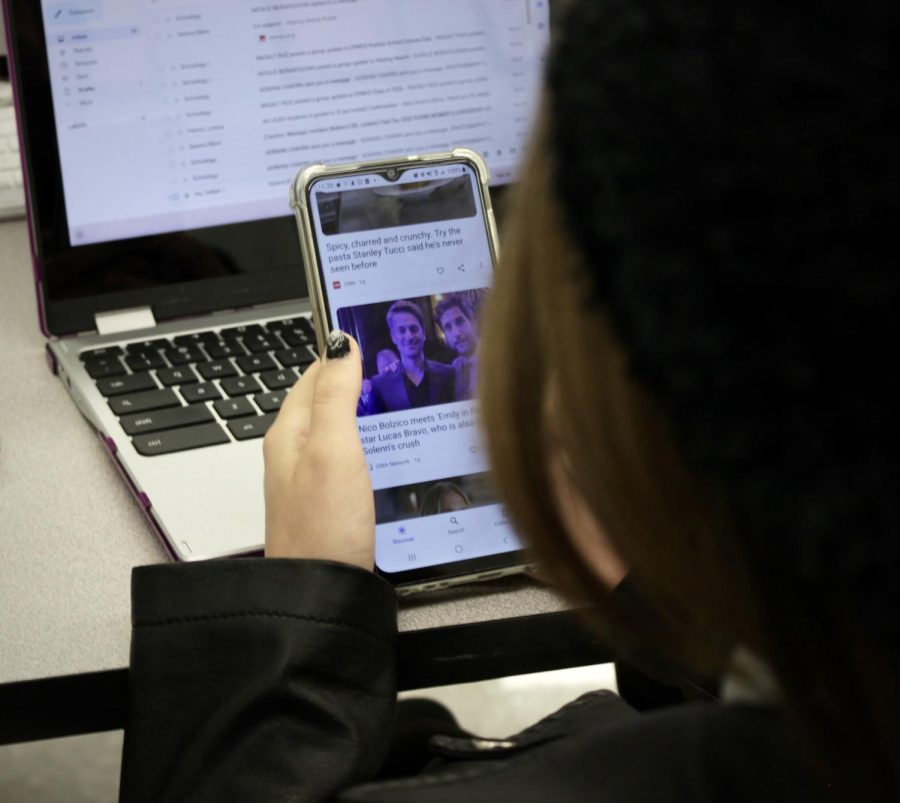A student browses through the day’s news while sitting in class. The new phone policy allows teachers to enforce stricter rules on cell phone use in the classroom.
New cell phone policy aims to increase diligence in classroom, leaves some students feeling restricted
November 4, 2022
Before this past Monday, there wasn’t much science teacher Timothy Hughes could do when attempting to confiscate the phones of students caught texting or listening to music.
“I think it’s about time we actually have something written down,” Hughes said. “The good thing about the policy is that it actually just backs up the policy that I already have.”
On Oct. 6, Daniel Pearl Magnet High School’s (DPMHS) Local School Leadership Council (LSLC) voted on whether or not the school should enact a phone policy limiting when students could use their phones during the school day. The vote’s majority swayed in favor of the phone policy, which went into effect on Oct. 31. Emails were sent to parents, and flyers containing the same information were passed out to students on Nov. 1.
“There was no old cell phone policy,” Principal Armen Petrossian said in response to the confusion among students. “Nothing was being enforced. The request came from the community.”
The policy states that unless permitted by a teacher or required out of medical necessity, students must have all electronic devices put away during instructional time. These devices will only be permitted for use before school, during lunch and after school, unless otherwise allowed. It also includes a progressive discipline system with levels of consequences based on how often the student is caught with their device.
Secretary and sole student representative of the LSLC Delilah Brumer disagreed.
“I think the vote was quite unfortunate,” said Brumer, Print Editor-in-Chief of the Pearl Post. “It’s very infantilizing to have, like, a phone cubby or phone jail where every student puts their phone in at the end of the period, which is what some teachers have done.”
Brumer also shared how frequently she was approached by students from all grade levels before the vote, requesting that she resist it and if nothing else, fight for the students’ right to take their phones to the bathroom. She implores all students who’d like to have a voice in making these decisions moving forward to come to the bimonthly LSLC meetings and contact her with any questions.
“It’s important to have student voices involved in this,” Brumer said. “We can’t learn to manage our time wisely if we’re being treated like little children.”
While some students have already begun to openly protest the policy’s progressive discipline system, otherwise known as the infraction system, others are less resistant or even indifferent to the new rules being set in place.
“I think it’s important to establish rules on phones because then, if we didn’t, everyone would take even more advantage of it, and just be on their phones all day and just be distracted,” freshman Jenny Marquez said.
Marquez added that she felt it was a solid policy overall and that enforcing it would enable students to pay more attention during classtime, something she thinks should already be commonplace.
Junior Anthony Jimenez shared Marquez’s sentiments, believing the policy won’t personally impact him as he already refrains from using his phone during most classes.
“I can’t really say that I’m a fan of it or that I like it. I’m in the middle,” Jimenez said. “You’re in school to, you know, receive an education. You’re here to learn. And if you’re using your cell phone all the time, you can’t really do that.”
While the policy may seem drastic to many students, their teachers are the ones who will ultimately choose whether or not to enforce it during their instructional periods. Petrossian insists the policy’s intention isn’t to punish students, but rather to aid those struggling academically by removing a primary temptation.
“It’s a big distraction,” Petrossian said. “So hopefully, with the cellphone policy, as well as instruction being more engaging, both of them will work hand in hand and students will participate more in class and be more engaged.”
Maya Gelb also contributed to the reporting of this article.
